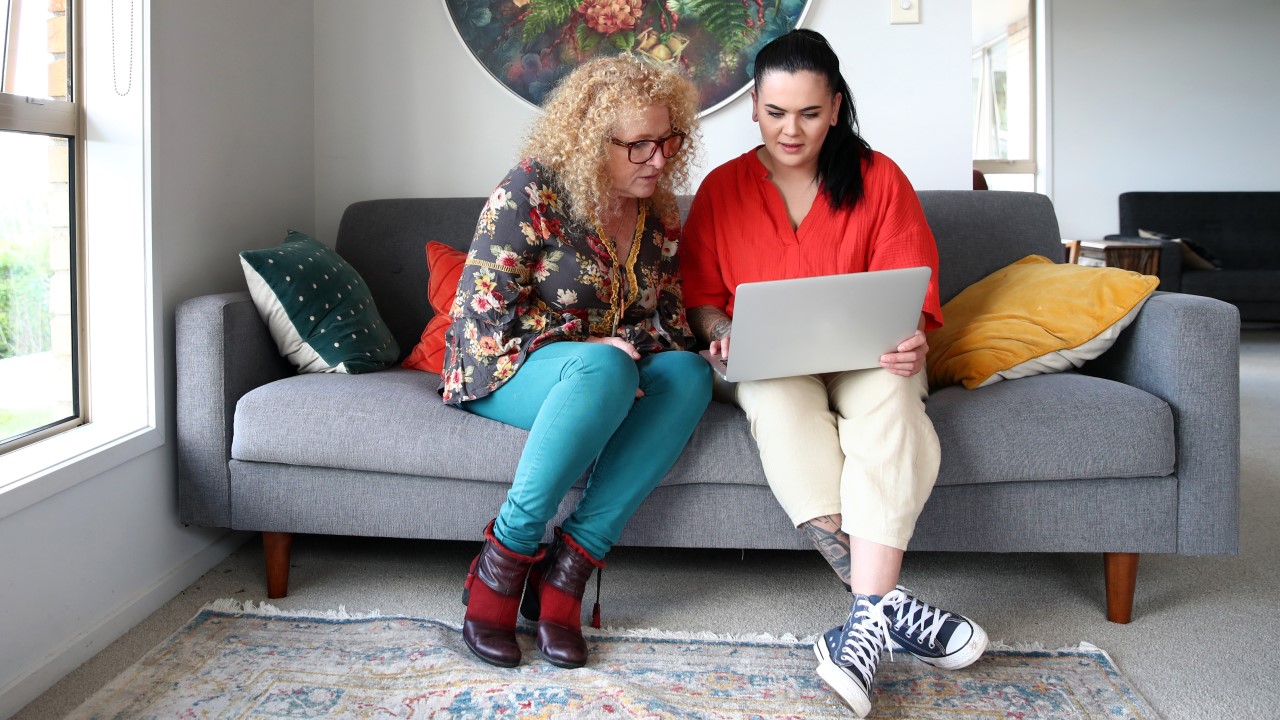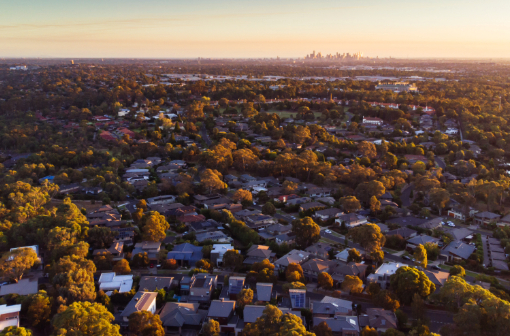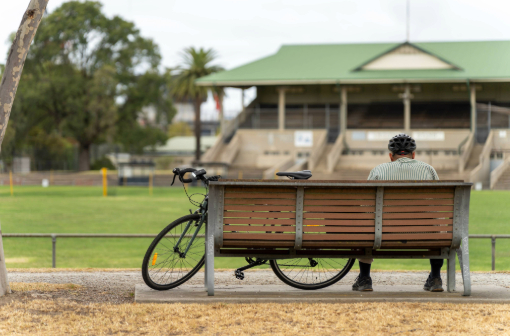Key points
- According to the Australian Unity Wellbeing Index someone’s sense of “future security” can affect their overall sense of wellbeing.
- Future security means different things to each of us, but it generally reflects our confidence in our future financial position.
- An ability to experience hardship, and bounce back from it, helps us assess our future with greater clarity and confidence.
Anxiety is part of the human experience. Feeling a little anxious in some situations is normal and can even be beneficial – as humans developed, our anxiety responses helped keep us safe, flagging potential threats and helping us avoid danger. Today, however, our anxiety is typically focused less on avoiding ancient predators, and more on our future security – which can have a significant impact on our wellbeing.
According to the Australian Unity Wellbeing Index, a 20-year study into the wellbeing of Australians conducted in partnership with Deakin University, “future security” means different things to each of us as we strive for a stable and rewarding future. Whether we’re looking forward to becoming more financially secure, being able to retire comfortably or building quality relationships, our feelings towards our future have a very real impact on our present wellbeing. It’s why the Wellbeing Index measures future security as one of seven key domains, or factors, of wellbeing.
So how do our worries about our future security impact on our wellbeing, and what can we do to feel more in control?
The very human need to feel in control
Thinking about our future can be overwhelming. Humans rely heavily on a sense of control in order to feel secure – and, considering no-one can yet predict the future, it’s no wonder that a sense of “not knowing” can cause us to feel worried.
“Our minds continually seek out problems for us to solve so that we reduce uncertainty and feel in control of our environments,” explains Dr Eleanor De Ath-Miller, Senior Consultant Psychologist and Clinical Neuropsychologist at Transitioning Well.
Our inability to guarantee our future means we can perceive a lack of control – which, in turn, triggers our anxiety. So how can we counteract the worry that we experience when thinking about things like our future job security, relationship stability, or even our future finances?
To respond to anxious thoughts, Eleanor suggests making a mental note of what you are thinking and feeling. “If we observe what’s going on in our minds and without giving ourselves a hard time about it, we can learn to respond to our thoughts and feelings with more flexibility,” says Eleanor.
It’s this flexibility that Eleanor attributes to “the velcro mind” – a concept that details how the human brain has evolved to protect us from making the same mistakes over and over by sticking to the bad experiences like a piece of velcro. When we’re assessing our investment strategies, contemplating a new relationship or wondering where our careers will take us, our velcro mind guides us through our decision-making.
“That [feeling] isn’t necessarily anxiety. It’s our velcro mind reminding us of previous bad experiences or outcomes,” explains Eleanor. By learning from our past, we make better decisions and increase our sense of perceived control, which can help to reduce our anxiety about our future.

How resilience plays a role in shaping our futures
In recent years, the concept of resilience has taken centre stage in conversations about wellbeing. Being able to accept perceived (or real) failures and recover from them is important for our psychological health.
“Our perception of the future affects everything,” explains Jessica Stott, Service Delivery Manager at the Women's Information Referral Exchange (WIRE). An Australian Unity community partner, WIRE provides information, support and referrals to Victorian women, non-binary and gender-diverse people.
“If we have the ability to be resilient and know that we can bounce back from difficult experiences, it lets us take risks,” explains Jessica. “This enables us to challenge ourselves and grow.”
Resilience is vital in building a better future. It allows us to try different approaches to life and learn where we need to improve. Resilient people generally have a more positive outlook about the future, because they know they can try, fail and try again in a better way. In turn, this gives them a sense of control – not because they can actually control their future, but because they know they can survive it.
“Often we see the people who have been through the most, who have had the hardest circumstances, are the most resourceful. They’re able to get more creative in ways to overcome challenges and advocate for themselves.” says Jessica.
The ability to experience a hardship and bounce back from it helps us assess our futures with greater confidence and clarity, and this resilience help boost our wellbeing and sense of security.
Get the latest in wellbeing research
The Australian Unity Wellbeing Index offers an annual insight into the wellbeing of Australians.
Strategies to cope with future-based anxieties
Everyone wants to feel more secure and in control of our futures, regardless of whether we’re considering a small decision – like whether or not to take that holiday – or a major life-changing event, such as starting a business, having a baby or planning for retirement.
Eleanor suggests that the next time you are worrying about what your future holds, try one of these strategies. “These useful techniques that work with our mammalian neurophysiology rather than against it,” she says.
- Write a list. Draw up three columns and write out what you can control, what you can influence, and what you cannot control. This helps show you where to direct your energy.
- Be mindful of what you're thinking and how you’re feeling. Any activity that brings your awareness out of the past or future and into the present moment is useful. It might be a mindfulness app, or simply taking a few minutes to stop what you're doing, focus on your mind and body, and observe thoughts and feelings.
- Drop the struggle against negative thoughts. If negative thoughts aren’t directly affecting your wellbeing, ask yourself: can you let them just be there? Try to understand your thoughts and why you’re having them. We are taught early in life to push negative feelings away, but research shows us that suppressing a thought or feeling actually makes it stronger.
- Name the trigger of your anxiety. There's a part of our brain that notices the thoughts and feelings we experience. When you’re experiencing anxiety or negative feelings, try naming them so you can assign them to a reason. For example, “I'm noticing feelings of anxiety,” or “There’s my mind worrying again,” or “Here’s the ‘I'm not good enough’ story again”.
- Be kind to yourself. Being gentle on yourself isn’t easy and can feel quite unnatural. That's okay. Try not to judge how you're dealing with the unpleasantness. When we accept that things are challenging, we're much closer to being able to manage the issue than if we tell ourselves we’re weak for being a normal human.
- Make a plan. Ask yourself, “What is something I can do that is the right for me, and takes me closer to the life I want to live?”.
Like a movie or a good book, we can’t always predict the outcome of our future. This can be cause for excitement – but it can also be a source of worry, which can reduce our overall wellbeing. Recognising the signs of this type of anxiety is the first step towards overcoming it and living your full potential in the present.
Disclaimer: Information provided in this article is of a general nature. Australian Unity accepts no responsibility for the accuracy of any of the opinions, advice, representations or information contained in this publication. Readers should rely on their own advice and enquiries in making decisions affecting their own health, wellbeing or interest.


